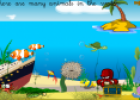Cargando...
Recursos educativos
-
Nivel educativo
-
Competencias
-
Tipología
-
Idioma
-
Tipo de medio
-
Tipo de actividad
-
Destinatarios
-
Tipo de audiencia
-
Creador
Lo más buscado
- Higiene personal
- La Europa carolingia
- Lagos de África
- Escritura pautada
- Juegos matemáticos
- Desarrollo emocional adolescencia
- Juegos educación física
- Descargar ejercicios de geometría
- Aprender a vestirse
- Lecturas con valores
- Aprender a montar en bici
- La ciudad romana
- Himalaya
- Adjetivos literarios
- Letras X
-

Animals in the water
Educarm Organización
- 1 lo usan
- 4250 visitas
In this activity we learn the names of the animals that live in the water.
-

Reflect. Bacteria 3.2
EduBook Organización
- 2333 visitas
How are saprophytic bacteria related to plants? Could plants live without these bacteria? Why/why not?
-

Insect hunt
Tiching explorer Organización
- 3919 visitas
In this activity we identify insects that live in land and ponds.
-

Argue. Immigrants in your community
EduBook Organización
- 1902 visitas
Discuss how immigration has affected your local community or the autonomous community you live in.
-

Families around the world
V&V Books Vicens Vives Organización
- 2 lo usan
- 1178 visitas
Find out how families live in different countries around the world
-

End-of-unit final evaluation T04 07 - The age of discoveries
EduBook Organización
- 1438 visitas
Where did the Incas live? Which vegetables did they cultivate? Who was the Inca?
-

Final evaluation 4 - The Animal Kingdom (I). Invertebrates
EduBook Organización
- 1362 visitas
Many simple animals (poriferans, cnidarians, planarians, etc…) live in aquatic environments. Explain why.
-

Final evaluation 1 - The Animal Kingdom (II). Vertebrates
EduBook Organización
- 1349 visitas
Explain the adaptations that fish have evolved to live in the water.
-

Reflect. Amphibians and water 2.2
EduBook Organización
- 1151 visitas
Why do amphibians need to live in humid areas or near water?
-

Answer. Today's migrations (1)
EduBook Organización
- 1147 visitas
Why is it said that we live in an age of migration?
Te estamos redirigiendo a la ficha del libro...













